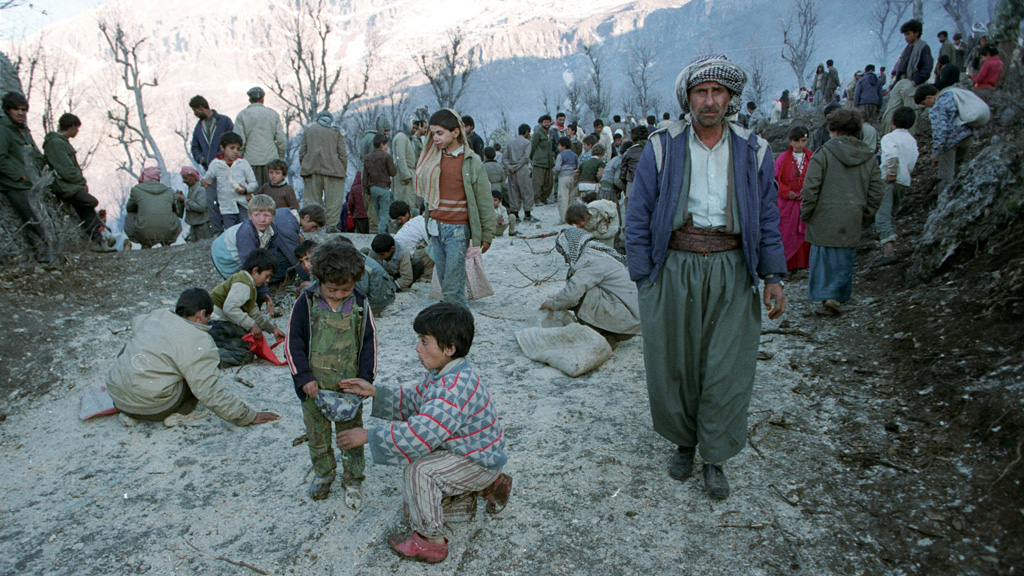What future for Iraq in the age of non-intervention?
It has been 23 years since my first visit to Iraqi Kurdistan and like many reporters who were there then I have never quite got over the beauty of the place, the warmth of the people, or the memory of what humanitarian intervention achieved here.
 Above: Iraqi Kurdish refugees in April 1991 (picture: Reuters).
Above: Iraqi Kurdish refugees in April 1991 (picture: Reuters).
Standing at the Kalak checkpoint yesterday, watching some of the perhaps 500,000 Iraqis on the move, took me back all those 23 years to 1991, when many more hundreds of thousands of Kurds were using the same roads to flee the helicopter gunships of Saddam Hussein. That was until British and American troops were deployed beneath a UN no-fly zone to protect them in what was known as “Operation Safe Haven”.
The Cold War was ending, and even if the west’s interests in Iraq were always about oil, we seemed to be witnessing the birth of a new doctrine of humanitarian intervention, enforced with military muscle.
The Kurds had been gassed by Saddam Hussein at Halabja in 1988, and doing nothing in 1991 wasn’t much of an option.
There have of course been non-interventions since – Rwanda being perhaps the most scandalous – but the decision not to intervene militarily after the use of chemical gas in Syria last year seemed to underline that what I witnessed in Iraq back in 1991 really had come to a juddering halt.
The wars of Iraq and Afghanistan and the terrible losses in blood and treasure there have made intervention a dirty word. The public in Britain and America are in stay-at-home mode. Oh what a difference 23 years makes.
And so it is that vast swathes of Iraq, where we intervened so dramatically in 2003, have fallen into the hands of Islamist extremists and one does not hear the patter of British and American army boots on the move.
Not that this is looking like a full scale humanitarian disaster: the movement of people is happening in summer not winter, and the exodus is largely from the baking plains to cooler higher ground, though the situation could well worsen.
I wonder, too, about the appetite of Kurdish peshmerga forces to intervene, even if Iraqi Kurdistan has perhaps 200,000 men under arms. Because the truth is that the failure of large parts of Iraq to function serves the purpose of reinforcing the Kurds’ own slumbering claim to recognition as an independent Kurdish state.
In 1991, the Kurds were on the run themselves. In 2014, they have fallen out with Baghdad on economic terms. They are determined to strike their own deals on oil exploration and now find themselves hosting an exodus of Sunni Arabs from further south who have discovered that Iraq’s Shia dominated army is either unwilling or incapable of protecting them.
There is a huge amount of resentment here, some of it I suspect driven by self-interest. Kurdish officials claim they warned Baghdad this offensive was coming and offered to cooperate to prevent it, only to be rebuffed. However, what cooperation are the Kurds really offering?
Mosul is largely divided between Arabs and Kurds in settlements on opposite banks of the River Tigris. To the Kurds, it is disputed territory, As is Kirkuk, which Saddam Hussein deliberately Arabised in an attempt to weaken the Kurdish territorial claim.
And talking to Kurdish friends, I get the sense that Kurdish forces will go as far as they need to go to reinforce what they regard as Kurdish interests and Kurdish territory and not much further. I suspect that what Hoshyar Zebari, Iraq’s Foreign Minister and himself a Kurd, says about cooperation with Baghdad to flush out extremist fighters is wishful thinking.
As Mr Zebari well knows, there is a saying here that Kurds “have no friends but the mountains”, and as long as the fighters of ISIS stay out of this mountain kingdom, many Kurds may well be content.
I could be wrong. There could be a coordinated effort to reverse this extraordinary situation, backed up by US air strikes.
But what we could also be witnessing here is the long-feared collapse of the Iraqi state along sectarian lines: unless the intervention-weary Americans can find a way of stitching Humpty Dumpty back together again.
Follow @jrug on Twitter.
